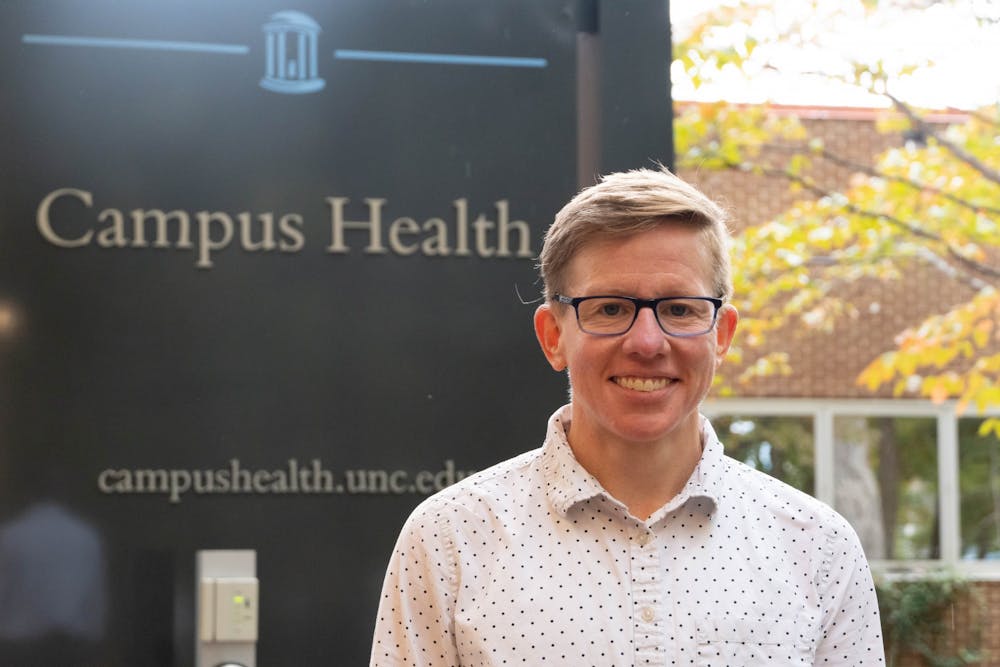Waitlist reduction plan
Cook said the partnership with Uwill has helped eliminate the waitlist for individual therapy students.
“In bringing on Uwill, it was really sort of a continued response to students saying we want more access to brief therapy, and we want more extended hours,” Cook said. "So there is no waitlist for any student that is appropriate for brief therapy. They're able to get connected really as soon as we meet with them."
Maddi Austin, a first-year journalism major and organizer of the Oct. 29 Protest for Mental Health outside Wilson Library, said the University conversation happening about mental health should’ve started earlier.
“This isn't the first time that suicides have happened on campus," Austin said. "And if nothing happens, this won’t be the last."
Austin said the issue is not necessarily with CAPS' waitlist reduction plan, but with the amount of counselors available and how many student they’re able to help. They said CAPS should be capable of providing services to every student on campus.
“I've even heard stories of people who got turned away from CAPS," Austin said. "Because they had already had previous therapy or because their issues were long-term and cannot be solved soon enough."
Media Relations said in a statement to The Daily Tar Heel that it is an industry best practice to refer students who have a longer history of psychological needs to an outside provider who can assist with more long-term care. The practice allows for a more cohesive and consistent care for students, the statement said.
First-year psychology major Yakob Lemma said he assisted Austin with the Oct. 29 protest.
Lemma said he hopes that that the University will devote more resources to diverse staffing and staff training at CAPS.
“If our campus has not taken the time to see if our students feel supported by the University, then that goes to show where the problem really lies,” he said.
CAPS has received criticism from students for its lack of diversity in the past. In March, students started a petition calling for more AAPI-identifying counselors, as CAPS did not have any. Over the years, students have requested for more therapists of color and, in September 2020, CAPS launched the Multicultural Health Program to serve Black, Indigenous and other students of color.
To get the day's news and headlines in your inbox each morning, sign up for our email newsletters.
A few weeks ago, Austin started a petition currently calling for more funding for CAPS that has garnered over 1,100 signatures.
Community need
UNC is hosting a Mental Health Summit on Nov. 15, led by Dr. Samantha Meltzer-Brody, chairperson of the psychiatry department in the School of Medicine.
CAPS representatives will be present at the Mental Health Summit along with parent, student, faculty and staff, she said.
Meltzer-Brody said the summit will bring together diverse voices and thought leaders to discuss what actions the University is already moving on, and to get consensus on the next steps in addressing campus mental health.
The amount of college-aged people with anxiety and depression has increased three to four times since the start of the pandemic, she said.
“That's a staggering increase," Meltzer-Brody said. "And so what campuses need to do is they really have to be able to adjust and move to address where the needs are now, not where they were in 2019.”
Meltzer-Brody said that when UNC returned to in-person classes, a large amount of resources went toward testing and vaccinations. The national mental health crisis is the next wave of community impact from the pandemic, she said.
“So what we're seeing on campus is really a microcosm of what we see in the state and what we see nationally," Meltzer-Brody said. "And I think that everyone is really just getting a sense of the full impact of it.”
Cook also said mental health is an issue much bigger than CAPS.
“Mental health right now is not an issue at UNC, it's not an issue at CAPS, it's an issue, sort of across the country and across the globe,” Cook said.
Meltzer-Brody said she thinks that as UNC moves forward, mental health has to be a priority.
“I'm very encouraged that the chancellor has made this a top priority. And I think that this will be meaningful as we move forward,” Meltzer-Brody said.
Austin said that they plan to attend the Mental Health Summit to propose more campus funding for CAPS and emphasize providing long-term care rather than just brief therapy for all students.
“CAPS is doing the best they can with the funding they have,” Austin said. "Unfortunately, it's not a lot.“
university@dailytarheel.com




